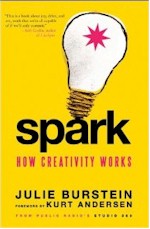 |
|
|
| ||||||
|
|
This page is the original source of this review, though you may also find it on Amazon or other sites. | ||
| Book Reviews Home | Free Audio Books | |
 |
Book Review of: SparkHow Creativity Works Price: $13.35 Availability: Usually ships
within 24 hours |
| Review
of
Spark, by Author (Softcover, 2011) (You can print this review in landscape mode, if you want a hardcopy) Reviewer: Mark Lamendola, author of over 6,000 articles. This was a good book, but I think the subtitle was hyperbolic and misleading compared to the actual content. The first part of the subtitle, "how creativity works" suggests a description of a specific process or processes. That's the meaning of "how," and that's not what this book describes. It describes "what." The second part, "inside the minds," however, is reasonably accurate. I didn't learn anything about how creativity works or how to be more creative. I did learn what 38 creative people went through to get to their creative pinnacles. Some of these people are just a tad beyond stellar, and most are highly respected in their fields. That might be what makes these particular stories so interesting and appealing. That, and the surprising obstacles some of these people overcame. I had several "Who would thunk?" moments while reading. If you have your own creative spark but it keeps getting doused, you will find encouragement from the accounts provided in this book. Five of the people in this book are quite famous: Robert Plant, Ang Lee, Kevin Bacon, Yo-Yo Ma, and Joyce Carol Oates. Of the first three,I have enjoyed their work very much. I can't "put my finger on" anything from Yo-Yo Ma or Joyce Carol Oates, but definitely know the names. Other readers may find a different mix of familiar names.
All of the people featured in this book were, at one time or another, guests on a radio show called "Studio 360," hosted on NPR. I do not like NPR (its statist viewpoints don't go over well with me) and do not listen to it, so I have never heard this show. But if the book is any indication, this is a fascinating radio show. This book consists of 9 chapters occupying 235 pages. The chapters are themed. For example, Chapter 6 is "Mothers and Fathers," and as you might guess the people who are featured discuss the influence their parents had on them. Not in general terms, but in specifics; each story is clearly unique. The book is well-written and entertaining. It can also provide some tidbits you can drop into a conversation to juice things up a bit--along the lines of, "Did you know Robert Plant recorded in Nashville? No, really. You want to know why?" And if you don't know why, that story is in this book. | |
About these reviewsYou may be wondering why the reviews here are any different from the hundreds of "reviews" posted online. Notice the quotation marks? I've been reviewing books for sites like Amazon for many years now, and it dismays me that Amazon found it necessary to post a minimum word count for reviews. It further dismays me that it's only 20 words. If that's all you have to say about a book, why bother? And why waste everyone else's time with such drivel? As a reader of such reviews, I feel like I am being told that I do not matter. The flippancy of people who write these terse "reviews" is insulting to the authors also, I would suspect. This sound bite blathering taking the place of any actual communication is increasingly a problem in our mindless, blog-posting Webosphere. Sadly, Google rewards such pointlessness as "content" so we just get more if this inanity. My reviews, contrary to current (non) standards, actually tell you about the book. I always got an "A" on a book review I did as a kid (that's how I remember it anyhow, and it's my story so I'm sticking to it). A book review contains certain elements and has a logical structure. It informs the reader about the book. A book review may also tell the reader whether the reviewer liked it, but revealing a reviewer's personal taste is not necessary for an informative book review. About your reviewer
About reading styleNo, I do not "speed read" through these. That said, I do read at a fast rate. But, in contrast to speed reading, I read everything when I read a book for review. Speed reading is a specialized type of reading that requires skipping text as you go. Using this technique, I've been able to consistently "max out" a speed reading machine at 2080 words per minute with 80% comprehension. This method is great if you are out to show how fast you can read. But I didn't use it in graduate school and I don't use it now. I think it takes the joy out of reading, and that pleasure is a big part of why I read. |
| |||||